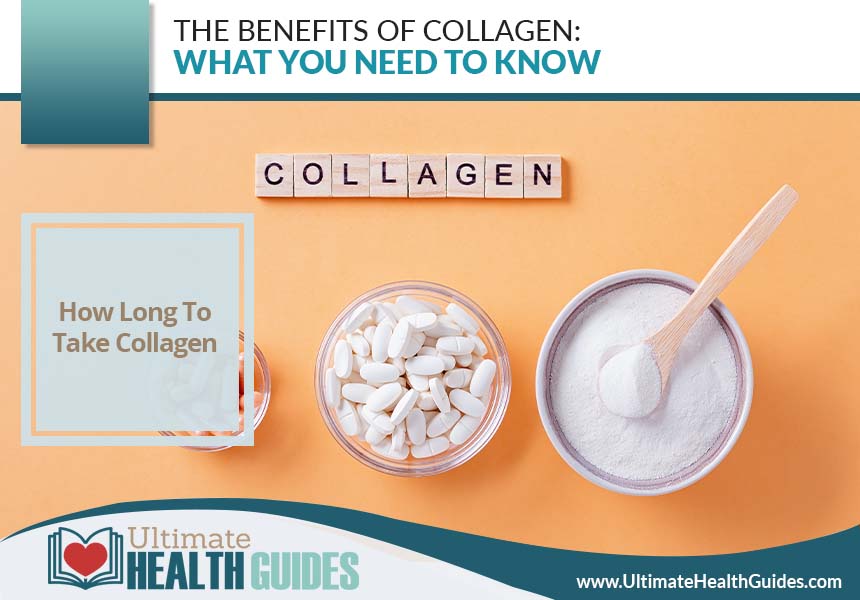In our youth, collagen is bountiful and helps keep the skin looking elastic and smooth. However, as we age, the body’s natural production of collagen declines, which can lead to wrinkles, joint pain, and a loss of muscle mass. While many supplements on the market promise to boost levels of this protein, not all deliver on their claims. Here, we will explore what collagen is, the benefits it offers, and how to take it for optimal results.

Collagen Basics And Facts
Collagen is the most abundant protein in the human body, and it plays a vital role in supporting the skin, bone, and connective tissues. As we age, our bodies produce less collagen, leading to wrinkles, joint pain, and other age-related problems. Fortunately, there are ways to boost collagen production and slow down the aging process.
One of the best ways to boost collagen production is to get enough protein in your diet. Collagen is made up of amino acids, so eating foods that are rich in protein will help support collagen production. Foods such as meat, fish, eggs, and beans are all good sources of protein. You can also take supplements that contain collagen-stimulating ingredients, such as vitamin C or hyaluronic acid.
There are also several lifestyle changes that you can make to support collagen production. Getting regular exercise helps stimulate collagen production, so make sure to get at least 30 minutes of physical activity each day. In addition, avoid smoking and excessive sun exposure, as these can both lead to collagen damage. Finally, be sure to drink plenty of water to keep your skin hydrated and healthy. By following these tips, you can keep your collagen levels high and delay the signs of aging.

Benefits Of Collagen
Collagen is the most abundant protein in our bodies, and it plays a vital role in supporting our skin, bones, and joints. As we age, our bodies produce less collagen, leading to wrinkles, joint pain, and other age-related issues. However, there are many ways to help combat the effects of aging by consuming more collagen. Here are some of the top benefits of collagen.
- For wrinkle prevention: Collagen is essential for maintaining youthful skin. By consuming more collagen, you can help reduce the appearance of wrinkles and fine lines.
- Joint pain relief: Collagen helps keep our joints healthy by providing support and lubrication. If you have joint pain, increasing your collagen intake may help reduce inflammation and improve mobility.
- Promotes bone health: Collagen is a major component of bone tissue. By consuming more collagen, you can help reduce the risk of osteoporosis and other age-related bone diseases.
- Supports gut health: Collagen helps heal and seal the lining of the digestive tract. This can lead to improved gut health and digestion.
- Detoxification and improved gut health: Collagen can help bind toxins and heavy metals in the gut, making them easier to eliminate from the body. This can lead to improved overall health and well-being.

Collagen Side Effects
Collagen is a protein that is found in the skin, tendons, ligaments, and joints. It is responsible for the elasticity and strength of these tissues. As we age, our bodies produce less collagen, leading to wrinkles, sagging skin, and joint pain. To combat these effects of aging, many people turn to supplements made from collagen peptides. However, there are some potential side effects associated with taking collagen supplements.
The most common side effect is gastrointestinal discomfort, such as bloating, gas, or diarrhea. This is usually because our bodies are not able to break down and absorb collagen peptides as easily as other proteins. As a result, they can cause digestive upset when taken in large amounts. If you experience any gastrointestinal side effects after taking collagen supplements, try reducing the dosage or taking them with meals.
Another potential side effect of collagen supplementation is allergic reactions. Some people may be allergic to fish or bovine sources of collagen peptides used in supplements. If you experience any hives, swelling, or difficulty breathing after taking a collagen supplement, stop taking it immediately and see a doctor.
Finally, it’s important to note that there is no evidence that collagen supplements have any anti-aging benefits. While they may improve the appearance of your skin temporarily, they will not reverse the signs of aging or prevent future wrinkling. If you’re looking for an anti-aging treatment, talk to your dermatologist about proven options, such as retinoids, laser therapy, or injectable fillers.

How Long To Take Collagen
Collagen is a protein found in the connective tissues of our bodies, including the skin, muscles, tendons, and bones. It plays an important role in maintaining the structure and integrity of these tissues. As we age, our bodies produce less collagen, leading to wrinkles, sagging skin, and joint pain. Collagen supplements have become popular in recent years as a way to combat these effects of aging. But how much collagen should you take, and for how long?
Most experts recommend taking collagen for at least eight weeks to see noticeable results. This is because it takes time for your body to synthesize collagen into new tissue. You may see some results within the first few weeks, but it will take longer for your skin to become noticeably firmer and your joints more pain-free. If you want to maintain these results, you will need to continue taking collagen indefinitely.
When it comes to dosage, most experts recommend taking ten to twenty grams of collagen per day; this can be taken all at once or spread out throughout the day. You may need to experiment to find the dosage that works best for you. Some people find that they experience digestive issues when they first start taking collagen supplements. If this is the case, try taking a smaller dose or spreading it throughout the day. You can also try taking it with meals to help reduce any digestive discomfort.
Are you looking for a way to reduce the signs of aging? Collagen may be worth considering. Just be sure to take it for at least eight weeks and at a dosage of ten to twenty grams per day for the best results.

Some Collagen Alternatives
Though collagen is the most well-known protein for anti-aging purposes, other proteins can be just as effective in reducing the appearance of wrinkles and fine lines. Elastin, for example, is a protein that helps keep the skin firm and elastic. Unlike collagen, which is produced by our bodies, elastin must be derived from external sources. One way to get elastin is through topical treatments, such as creams and serums. Another option is to consume foods that are rich in this protein, such as soybeans and sea creatures like oysters and shrimp.
Another alternative to collagen is hyaluronic acid. This substance occurs naturally in our bodies and plays an important role in keeping our skin hydrated. When applied topically, hyaluronic acid can help plump up the skin and reduce the appearance of wrinkles. It can also be taken orally in the form of supplements. Along with hydrating the skin, hyaluronic acid has also been shown to provide joint pain relief.
While collagen remains the most popular choice for anti-aging purposes, there are other options available for those looking for alternative treatments. Elastin and hyaluronic acid are two possible alternatives that can help reduce the appearance of wrinkles and keep the skin hydrated.
Collagen supplements are a popular way to reduce the signs of aging. They work by helping the body synthesize collagen into new tissue, which can lead to firmer skin, reduced joint pain, and other benefits. Most experts recommend taking collagen for at least eight weeks to see noticeable results, and you may need to continue taking it indefinitely to maintain those results.

When it comes to dosage, most experts recommend taking ten to twenty grams per day. You may need to experiment with different dosages until you find one that works best for you. Collagen supplements can be taken all at once or spread out throughout the day. Some people experience digestive issues when they first start taking them, but this usually goes away after a few weeks.
If you’re looking for an alternative to collagen, elastin and hyaluronic acid are two good options. Elastin helps keep the skin firm and elastic, while hyaluronic acid keeps the skin hydrated. Both of these proteins can be derived from external sources like creams and serums or foods like soybeans and seafood.














